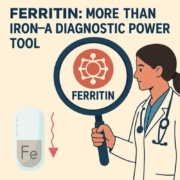Ferritin: More Than Iron—A Diagnostic Power Tool
Ferritin often hides in plain sight on lab reports. But if we had to pick a favorite lab value—it would be this one. Why? Because ferritin is a multitasker. It’s one of the few lab values that offers insights into both iron metabolism and inflammation—making it a subtle but powerful indicator of what’s going on beneath the surface.
Ferritin 101: More Than Just an Iron Marker
Ferritin is often billed as a marker of iron stores. True! But that’s like saying your dog is just a pet—it’s also a security guard, emotional support system, and leftover vacuum.
Ferritin also acts as an acute phase reactant, meaning it can spike in response to inflammation. That dual personality makes it incredibly useful—and sometimes a little tricky—in clinical practice.
Let’s look at two very different patients whose ferritin levels pointed us in two very different diagnostic directions.
Case One: The 46-Year-Old Woman with Chronic Fatigue
She came to our clinic with all-too-familiar symptoms: relentless fatigue, poor sleep, and periods that could qualify as an endurance event—six days, heavy every month. A CBC was done elsewhere. Her hemoglobin? Normal. Verdict? “You’re fine.”
But at the Kaplan Center, we don’t settle for “fine.”
We dug deeper. Her ferritin was a level nine. Single digits. Yikes. We aim for ferritin levels above 50 ng/mL for optimal energy, cognitive function, and restorative sleep.
What’s tricky is that her hemoglobin was still normal—because the body was borrowing from its iron reserves to keep the ‘checking account’ looking normal. But her ‘savings account’—her ferritin—was very low. Like someone covering bills with a dwindling emergency fund, she was running on borrowed resilience. Eventually, those reserves dry up—and that’s when symptoms like fatigue, disrupted sleep, and poor stress tolerance start showing up loud and clear.
Her WatchPAT sleep study also showed no sleep apnea, but she had frequent awakenings, poor sleep efficiency, and trouble maintaining deep sleep. While ferritin doesn’t control sleep stages directly, low iron stores are known to impair energy production, dopamine synthesis, and thermoregulation—all of which can contribute to non-restorative sleep.
Iron isn’t just about oxygen transport. It’s about mitochondrial health, dopamine production, and helping your brain power down at night. So if your labs look “normal” but you feel anything but normal, find someone who will look beyond the surface.
Case Two: The 25-Year-Old Man with Long COVID
He was a healthy athlete until a tick-borne illness and COVID knocked him flat. Now? Crushing fatigue, post-exertional malaise, and brain fog. He had headaches and saw strange visual patterns. His ferritin level came back at 144 ng/mL.
At first, you might think, “Great iron stores!” But not so fast.
In his case, the elevated ferritin was less about iron, more about inflammation. Ferritin is the body’s way of waving a red flag: neuroinflammation ahead. Using the Kaplan Method™, alongside specialized testing, we started him on a personalized comprehensive plan to regain his health so he could return to playing pickleball.
High ferritin can reflect inflammatory stress—something we often see in Long COVID, autoimmune conditions, and chronic infections. It’s part of the body’s acute phase response, kind of like sending in the fire trucks whether it’s a campfire or a five-alarm blaze.
Questions? Give Us a Call!
A Word on Teens, Ferritin & Cognitive Performance
Here’s another reason we love ferritin: it has the power to improve a teen’s cognitive function, academic outcomes, and even self-esteem—especially in adolescent girls (who are recently started menstruating). Most pediatricians only check hemoglobin level, not ferritin- so this is missed.
In the U.S., up to 40% of teenage girls have ferritin levels under 25 ng/mL, often missed because standard labs only check hemoglobin. But research shows that even non-anemic girls with low ferritin (≤12 ng/mL) perform significantly worse on tasks involving verbal learning, memory, and attention.
A randomized controlled trial conducted in Washington, D.C., studied non-anemic adolescent girls with ferritin levels ≤12 ng/mL. Over eight weeks, the group receiving iron supplementation experienced significant improvements in verbal learning and memory scores, while the placebo group showed no meaningful change. Ferritin levels in the treatment group rose from an average of 12 to 27 ng/mL, confirming that iron repletion—not just hemoglobin normalization—was key to improved cognitive performance.
At the Kaplan Center, our integrative model looks at not just what’s “in range,” but what’s optimal for function. We recognize that iron plays a key role in neurotransmitter synthesis, oxygen delivery, and mitochondrial function—all crucial for learning and brain development.
That means when we check ferritin in a tired, struggling teen, and supplement appropriately, we’re not just treating fatigue—we’re helping their brain catch up, their confidence grow, and their future open up.
The Kaplan Method®: Why We Ask “What’s Beneath This?”
At the Kaplan Center, we use ferritin as one of many clues in a larger systems-based, root-cause approach. The Kaplan Method® integrates immunology, neurology, functional medicine, and decades of clinical insight to understand why symptoms are happening—and how to reverse them.
We do advanced testing. We don’t just treat numbers. We look at patterns. We ask: Is ferritin low due to chronic menstrual loss, poor gut absorption, or chronic infection? Is it high because of oxidative stress and cytokine reactivity? Ferritin doesn’t just give us a number—it gives us a direction.
At the Kaplan Center, we don’t stop at “normal.” We pause, rethink, and investigate.
So there it is. Ferritin is my favorite lab value—because it gives us something priceless: insight. And sometimes, it’s the overlooked clue behind a foggy brain, a sleepless night, or that frustrating feeling when a sharp student just can’t seem to focus, no matter how many flashcards they flip. Do kids even make flashcards anymore? Either way—low ferritin might be why none of it’s sticking.
We are here for you, and we want to help.
Our goal is to return you to optimal health as soon as possible. To schedule an appointment please call: 703-532-4892 x2











Leave a Reply
Want to join the discussion?Feel free to contribute!